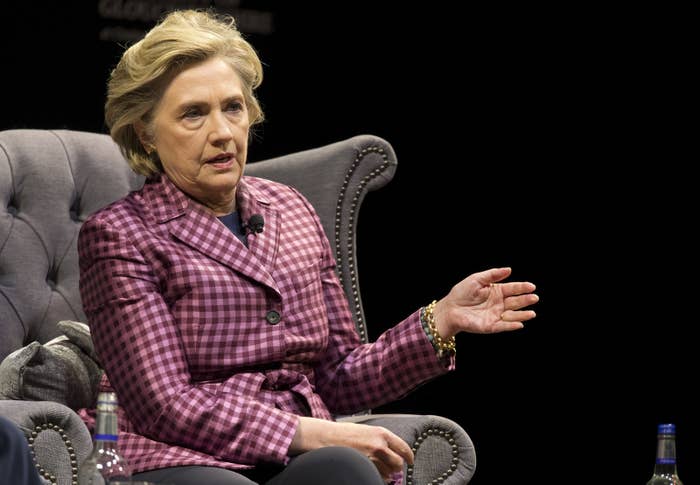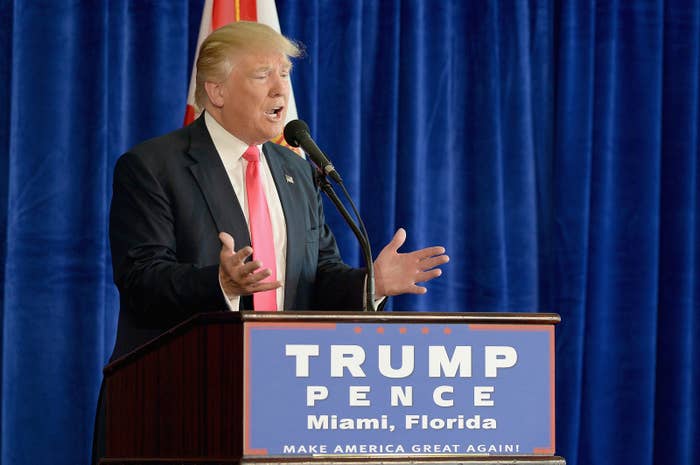
Weeks before Democrats realized their computers had been hacked, a professor tied to the Russian government told a member of Donald Trump’s campaign that the Russians held “thousands of emails” relating to Hillary Clinton, according to a court document made public Monday.
A summary outlining the guilty plea of former Trump campaign adviser George Papadopoulos says an unnamed “professor" with ties to the Russian government told him around April 26, 2016, that he had learned that Russia had “dirt” on Clinton, including the emails.
That was just weeks after Russian government hackers gained access to Clinton campaign chairman John Podesta's emails in March 2016 and nearly two months before the Democratic National Committee successfully expelled the hackers from its computer system, where they had been since the previous year, according to Crowdstrike, the cybersecurity firm the party hired to investigate the hack.
The hack of the DNC's computers was made public on June 14, 2016, in a story in the Washington Post.
Papadopoulos's guilty plea to charges of lying to the FBI provides the first suggestion that the Trump campaign knew well before its Democratic rivals that Russia had hacked Democratic computer systems and had purloined thousands of Clinton-related emails.
The DNC emails began to surface the day after the Post story appeared. That was when Guccifer 2.0, a “hacktivist” US officials believed was part of the Russian influence campaign, began publishing them on the website DCLeaks. Podesta's stolen emails were posted by WikiLeaks in October.
Papadopolous pleaded guilty Oct. 5 to lying to the FBI about his contacts with the professor and an unidentified Russian woman who he at one time believed, erroneously, was a niece of Russian President Vladimir Putin, and the court document unsealed Monday outlines those lies.
But it's not clear who in the Trump campaign Papadopoulos told about the emails or how far up the campaign's hierarchy the information might have gone. The document identifies Papadopoulos's campaign supervisor only as “the Campaign Supervisor” and provides no names for other campaign officials with whom he communicated.
According to the document, Papadopoulos first met the professor in Italy on March 14, 2016, shortly after he learned he would be serving as a foreign policy adviser to the Trump campaign. The document does not say why Papadopoulos, who lived in London at the time, was in Italy or how he came to meet the professor, who, the document says, had “substantial connections with Russian government officials.”
But it says that once the professor learned Papadopoulos was a Trump adviser, he took “great interest” in him. Trump announced Papadopoulos's campaign role on March 21, 2016.
The two next met in London on March 24, 2016, according to the document. At that meeting, the professor was accompanied by a Russian woman whom he introduced to Papadopoulos as a relative of Putin. According to the document, Papadopoulos emailed his supervisor after the meeting, saying the meeting had been about arranging a meeting “between us and the Russian leadership to discuss US-Russia ties under President Trump.”
A week later, Papdopoulos attended a meeting in Washington, DC, with Trump and other foreign policy advisers, the document says.
According to the document, the professor then introduced Papadopoulos over email to a contact in Russia's Ministry of Foreign Affairs, with whom Papadopoulos maintained an ongoing correspondence trying to arrange a meeting between the Trump campaign and Russian officials. Papadopoulos emailed a person identified only as a “senior policy adviser" to the Trump campaign on April 25, 2016, saying “the Russian government has an open invitation by Putin" to meet with Trump.
The information about the “dirt" and Clinton emails was conveyed by the professor to Papadopoulos at breakfast the next day in a London hotel. There, the professor told Papadopoulos that he had learned from high-ranking officials in Moscow that Russia had “thousands of emails.”
The summary contains no indication that Papadopoulos passed the information about the emails on to the campaign, but the document says he continued to message the senior policy adviser and a “high-ranking campaign official” about his contacts with the Russians until at least August 2016.
It was during that period that another meeting was held between Trump campaign officials and a Kremlin-affiliated lawyer, Natalia Veselnitskaya, at Trump Tower in New York. That meeting, on June 9, 2016, was attended by then Trump campaign chairman Paul Manafort, Trump son-in-law Jared Kushner, and Trump's son Donald Jr.

According to emails that he screengrabbed and tweeted, Trump Jr. arranged the meeting after a British entertainment publicist, Rob Goldstone, messaged that the “crown prosecutor of Russia” had “offered to provide the Trump campaign with some official documents and information that would incriminate Hillary and her dealings with Russia and would be very useful to your father.”
In July, after Papadopoulos and Trump Jr.’s meeting with Veselnitskaya, Trump openly called for Russian hackers to help find emails that Clinton had deleted from her State Department account.
“Russia, if you’re listening, I hope you’re able to find the 30,000 emails that are missing,” he said at a news conference in Florida. “I think you will probably be rewarded mightily by our press.”
